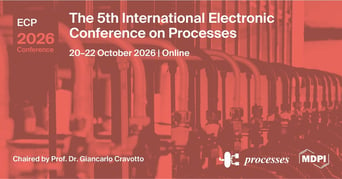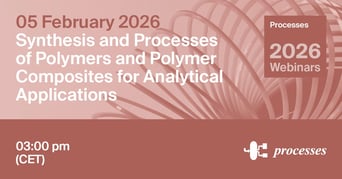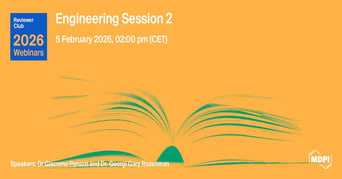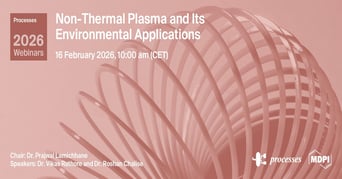- 2.8Impact Factor
- 5.5CiteScore
- 15 daysTime to First Decision
News & Conferences
Latest News & Announcements
Latest Conferences
Propose a Conference Collaboration
Promote and publicise your upcoming conference with MDPI.
All News & Conferences
MDPI Conference
The 5th International Electronic Conference on Processes
20 - 22 October 2026
News & Announcements
MDPI INSIGHTS: The CEO's Letter #31 - MDPI 30 Years, 500 Journals, UK Summit, Z-Forum Conference, APE
2 February 2026
News & Announcements
Academic Publishing Workshop at Swinburne University of Technology Sarawak Summary
30 January 2026
MDPI Conference
Processes Webinar | Synthesis and Processes of Polymers and Polymer Composites for Analytical Applications, 5 February 2026
5 - 5 February 2026
News & Announcements
Processes Webinar | Synthesis and Processes of Polymers and Polymer Composites for Analytical Applications, 5 February 2026
29 January 2026
5 - 5 February 2026
News & Announcements
MDPI Reviewer Club Webinar 2026 | Engineering Session 2, 5 February 2026
29 January 2026
News & Announcements
Meet Us at the TMS 2026 Annual Meeting & Exhibition, 15–19 March 2026, San Diego, California, USA
28 January 2026
News & Announcements
International Day of Clean Energy—“Clean Energy: For All and for Our Planet”, 26 January 2026
23 January 2026
MDPI Conference
Processes Webinar | Non-Thermal Plasma and Its Environmental Applications, 16 February 2026
16 - 16 February 2026
News & Announcements
Processes Webinar | Non-Thermal Plasma and Its Environmental Applications, 16 February 2026
21 January 2026
News & Announcements
Processes Travel Award—Winners Announced
9 January 2026
of 25







.jpg?v=1769683508)

